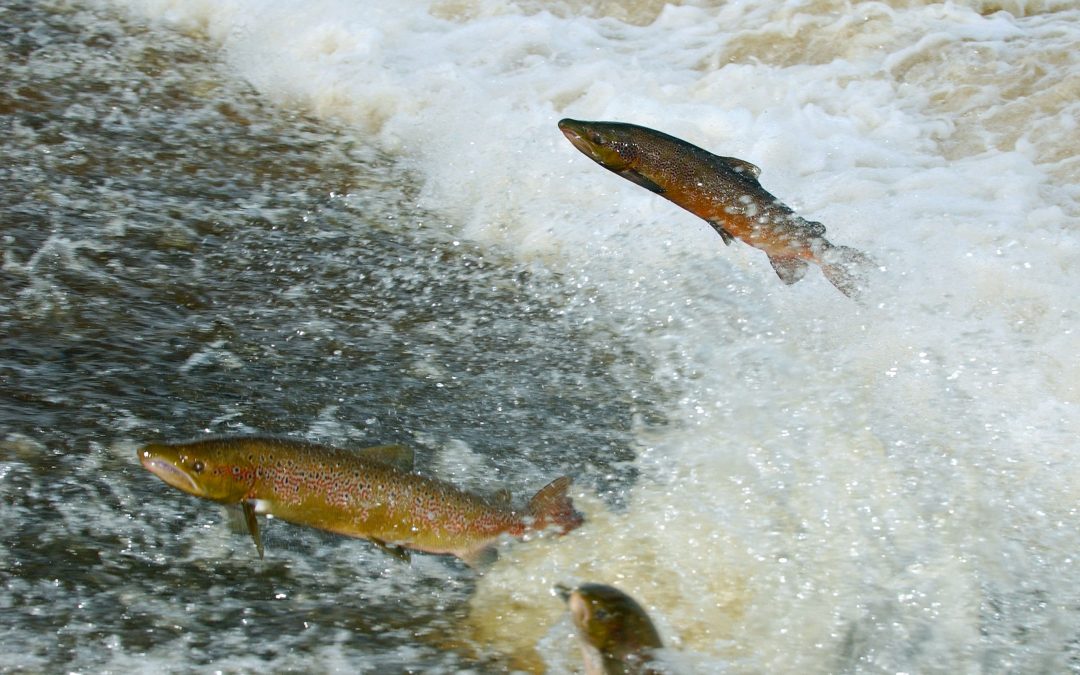To celebrate World Fish Migration Day, Adrian Dowding talks to the Western Morning News about our work on the Taw catchment.
Over the last six years a huge amount of my time and energy has been spent removing barriers to migrating fish in the River Taw.
This has involved taking out or adapting weirs, many of which date back to before the industrial revolution. Some of these have been relatively straightforward, while others have involved lengthy consultations and compromises with local interest groups.
It’s part of our vision to create a good clear migration route for fish, from stream to source, and in the Taw we are seeing large numbers of salmon, trout and lamprey returning to the rivers.
Stocks of freshwater fish like salmon and trout are falling dramatically across England. These species need to migrate to be able to reproduce, so free movement is essential to their survival.
Here in the South West we’re making good progress: in 2014 we removed over 200 obstacles from rivers in Devon and Cornwall, which resulted in opening up over 1000km of spawning habitat to migratory fish that was previously inaccessible. Our work has been supported by local groups and government funding.
Ultimately, the plan is for us to open up the entire Taw catchment, leading the way for other catchments across the South West and nationally. If we can achieve that, it won’t just be the fish who benefit.
A plentiful stock of freshwater fish a good indicator that a river is healthy, and fish are also an important part of the ecosystems in our rivers (the way in which plant, insect and animal species interact). As rivers provide us with our drinking water, as well as supporting a range of leisure activities ranging from angling to walking, it’s vital that we look after them.
A healthy fish population means a healthy river, and a healthy river benefits all of us. Not only is it good for the economy – anglers apparently spend £3billion a year on their sport and support 37,000 full-time jobs – it is also good for us physically and spiritually.
We can’t put a figure on the way being by the river makes us feel. While it can’t be quantified in the same way as the monetary value of the fishing industry, spending time by the river is incredibly calming, reviving and enjoyable.
The rivers are the unsung heroes of the South West. Devon and Cornwall are renowned for their beaches – and rightly so – but having spent a large portion of my working life on the river bank, I feel that the quiet beauty of our streams, rivers and estuaries is too often overlooked.
From my work in North Devon, I know that positive changes that will benefit the rivers can only happen when people work together. Anglers and farmers are often the first to spot when something is going wrong and their activities can also have a major impact on the watercourses. For example, if farmers encourage coarse woody debris to grow on the river bank it can triple the number of fish in rivers, because this vegetation not only provides a buffer for the river but also supports the invertebrates that feed the fish.
Without having people regularly using and visiting the rivers, we can easily lose sight of changes, whether it’s the arrival of invasive species – like Japanese knotweed or Himalayan balsam choking out the riverside’s native plants – or reduced numbers of salmon or trout passing through.
We’ve seen how tapping into this local knowledge can help us make the right decisions for rivers in Devon and Cornwall. At the Westcountry Rivers Trust we often talk about the importance of us all reconnecting with the rivers. If we can truly achieve that, we will all take better care of them.
Share Tweet
